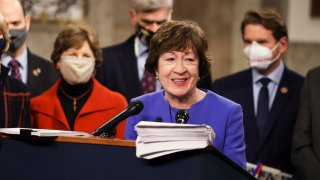
Are you and your family changing your holiday spending this year because of the coronavirus pandemic? CNBC Make It would like to talk to you. Email money reporter Alicia Adamczyk at alicia.adamczyk@nbcuni.com.
Less than two weeks before 12 million Americans are set to lose jobless benefits and eviction protections around the country expire, a bipartisan group of federal lawmakers introduced a $908 billion coronavirus relief package, a starting point for negotiations that Sen. Susan Collins (R-Maine) is calling a "Christmas miracle."
The package is broken into two bills: The $738 billion Bipartisan Emergency COVID Relief Act of 2020 includes funding for enhanced unemployment benefits, another round of small business loans, emergency food assistance and emergency rental relief, among many other provisions, according to a summary of the package.
Meanwhile, the $160 billion Bipartisan State and Local Support and Small Business Protection Act of 2020 provides liability insurance for businesses and funding for state, local and tribal aid.
Congress has been at odds for months over what to include in the next coronavirus relief package and that's why the package is broken into two parts. There's room to compromise on the bill that includes liability insurance for businesses, which Republicans are advocating for, and state and local aid, which Democrats say is a must.
"This is hope for those who have been asking their Congress to be responsive to what they've seen in the face of the pandemic," Sen. Lisa Murkowski (R-Alaska) said a press conference Monday.
The bill does not include funding for another round of stimulus checks, which was a popular component of the CARES Act.
Money Report
Here are some of the main provisions in the latest relief package:
Unemployment insurance
An estimated 12 million people are at risk of losing their jobless benefits the day after Christmas when two important CARES Act programs expire: The Pandemic Unemployment Assistance (PUA) program, which extended unemployment benefits to gig workers and freelancers who don't normally qualify, and the Pandemic Emergency Unemployment Compensation (PEUC) program, which provides an extra 13 weeks of UI to those who have exhausted their state's benefits.
The bipartisan bill would extend all unemployment insurance benefits for 16 weeks, presumably including those two programs, while funding enhanced federal benefits of $300 per week for that time period.
Emergency food assistance
Nearly 12% of Americans, or 25.7 million people, reported not having enough to eat at the beginning of December, according to the Household Pulse Survey released by the U.S. Census Bureau on Dec. 2. The bipartisan bill provides $13 billion for increased SNAP assistance and funding for food banks and pantries.
Emergency rental assistance
Housing advocates have been warning of an eviction crisis for months, predicting millions could lose their homes when the federal eviction moratorium expires at the end of the year. The bill would extend the eviction ban through January 2021, and provide $25 billion for emergency rental assistance.
At that time, it is possible that President-elect Joe Biden could extend the moratorium by executive action, as President Donald Trump did over summer 2020.
Small business loans
The bill includes $300 billion for another round of Paycheck Protection Program loans.
Student loan forbearance
Currently, federal student loan payments are on pause until the end of the year, without interest accruing. The bill proposes extending that forbearance until April 1, 2021.
Also included in the bill: Funding for vaccine distribution, mental health and substance abuse issues, child-care services and assistance for airlines, airports, Amtrak and public buses.
Read next: Bipartisan group releases Covid relief bill as Congress faces pressure to send help
Don't miss: Here are the 5 best personal loans of December 2020






